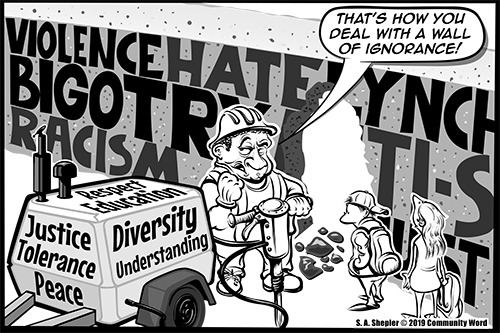 The assault at Tree of Life Synagogue in Pittsburgh, where a gunman opened fire during Saturday morning worship, continues the tsunami of violence, bigotry and hate sweeping the country.
The assault at Tree of Life Synagogue in Pittsburgh, where a gunman opened fire during Saturday morning worship, continues the tsunami of violence, bigotry and hate sweeping the country.
What’s the solution?
A panel of a dozen local religious and civic leaders convened in Peoria in December for a discussion at Sam Stone B’Nai B’Rith Covenant Apartments to explore ways every individual can step forward to curtail hate, extremism and anti-semitism.
Chorbishop Faouzi Elia, St. Sharbel Church, said voters must force Congress to act responsibly and restrict access to assault weapons. He said there are more weapons and rounds of ammunition in the homes of people in our community than there are at the police station.
Other panelists stressed the need to go beyond “tolerance” and learn to respect people from different races, nationalities and religions. Make deliberate decisions to meet people from different backgrounds and be open to learning about them.
Many said bigotry should be resisted, not tolerated with silence.
“Anyone who wants to live in a civil society needs to fight against anti-semitism and discrimination,” said Susan Katz, executive director of the Jewish Federation of Peoria.
Dr. Farris Muhammad, chief diversity and inclusion officer with the city of Peoria, said we live in a time when people doing wrong think they are doing right. Education and diversity training are needed.
One panelist said the solution is within “good families,” and so many people are in jail today in this country because they didn’t come from good families. No one can argue against “good families,” but for anyone who understands the history of this country, “good families” is a dog whistle.
Pew Research Center found the rate of incarceration for Blacks is more than five times the rate for whites. It is not because of factors labeled as good or bad but due to institutional racism and implicit bias. The system works against their success, and recidivism rates are high.
Sure, everyone wants all families to be “good families,” but history confirms policy, practice and law deliberately undermines the stability of African American families.
The bronze statue at the entrance to the National Memorial for Peace and Justice in Montgomery, Ala., shows chained Africans dragged from a ship to an auction block and sold, separating the father from his wife and child.
Following the Emancipation Proclamation freeing slaves, a wave of lynching swept the country targeting Black men, women and children. The codified discrimination during the Jim Crow era was designed to emasculate Black men.
The response to crack cocaine that decimated Black communities –– criminalize and incarcerate. The response to opiod addiction –– treatment. It’s easy to document that marijuana use is about equal between Blacks and whites, but Blacks are imprisoned at rates up to seven times higher. Three-strikes-and-you’re-out laws almost surgically target Black men.
“Good families” is a linguistic ploy. It seems to imply one thing that is universally embraced, but it is understood as something completely different. No one says we don’t need good families, but what we actually need is truth and honesty to acknowledge a deliberate practice in this country to contain, control and destroy Black families.
The eight-page supplement in this issue of Community Word includes personal accounts from Peorians Pam Adams and Sherry Cannon about their visit to the National Memorial for Peace and Justice and the Legacy Museum in Montgomery, Ala. These two new museums are unlike any other in this country, and they document the continuum of deliberate efforts to contain, control and destroy.
One solution to our tsunami of racial violence and hate is to study and reconcile our history. The truth is hard, but we can’t continue to claim we are an exceptional country. If we want to become one, we have to understand our legacy of injustice.
“If you are unable to understand the cause of a problem, it is impossible to solve it.” – Naoto Kan

Recent Comments